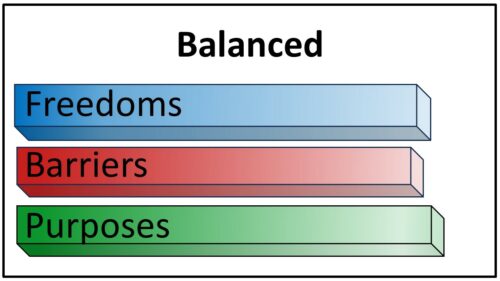Life is a Game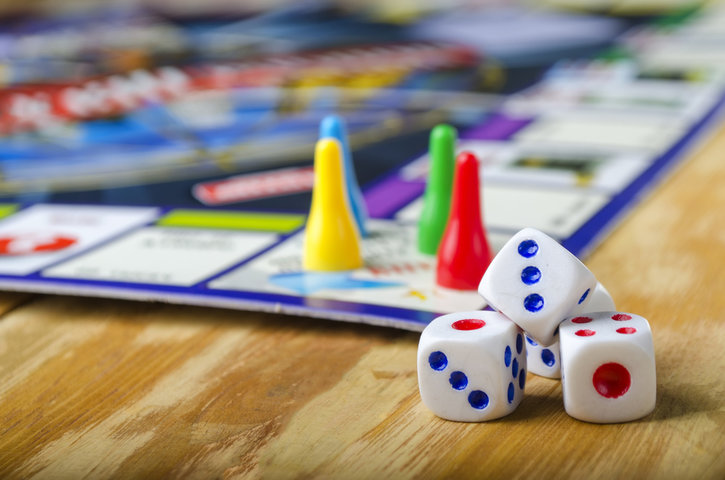
Your job is a game. Building a business is a game. Getting rich and famous is a game.
Forming relationships, raising children, accomplishing your goals, improving yourself, accumulating power and everything else you want do to in life are just games.
Once you learn how life games work, as discovered by L. Ron Hubbard, you can plan and win your games with more success and less stress. They become as fun as tennis, poker, Angry Birds, political elections and tug-of-war!
Start by understanding the three parts.
Three Parts of a Game
“A game consists of freedoms, barriers and purposes.” — L. Ron Hubbard
FREEDOMS are opportunities to succeed. Anything that helps you win the game are freedoms. Examples: your education, your money, your hard work, your skills, support from others and all your advantages..
BARRIERS are the problems you must solve or get through to win the game. They include the challenges, difficulties and competitors. Examples: body problems, debts, wrong decisions, bad environments and your enemies.
PURPOSES are the reasons why you play a game. They include your goals, objectives, passions, intentions and rewards that you seek in each game.
For example, you play a football game and run down the field. Your strong legs, teammates and the open field are your FREEDOMS. The other team is trying to stop you; they are a BARRIER. Your PURPOSE is to get past the other team and score.
Winning a Game
When you have a balance between the FREEDOMS, BARRIERS and PURPOSES, you play the game most efficiently and, sooner or later, you win.
When the parts of your game are not balanced, you lose the game. Below are four story examples.
Game #1: Isabella’s Restaurant Game
Isabella’s PURPOSE is to own and operate “Bella’s” Italian restaurant. Her FREEDOMS include her delicious family recipes, her family’s support and her dedication to her lifetime dream. She has no idea how many BARRIERS she must conquer to reach her dream.
Isabella is confident she can serve incredible food in a comfortable space with a delightful staff at great prices. So she takes the leap, rents an empty building and uses most of her savings to buy equipment, dishes, tables and a big sign. Bella’s grand opening is packed with supporters.
A few months later, Isabella discovers she is losing money. Even though people love how Bella’s makes them feel happy, her costs are higher than her income. She is accomplishing her PURPOSE, but she is losing her game.
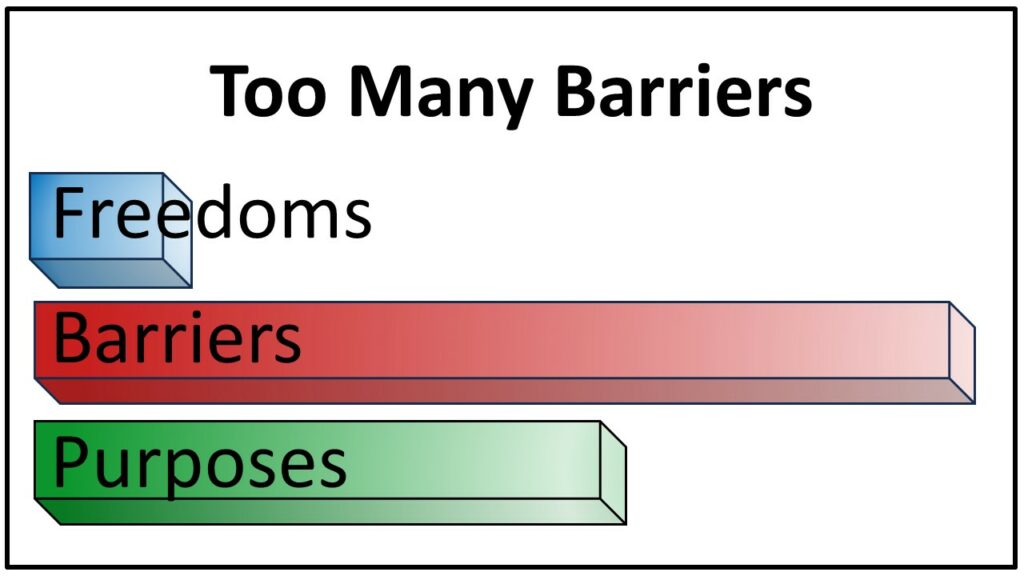 To cut payroll costs, Isabella works 15 hours per day, 7 days each week, cooking, serving and cleaning up. Her back is in constant pain and her mind is in constant worry. She has no time to spend with her husband and two teenage daughters.
To cut payroll costs, Isabella works 15 hours per day, 7 days each week, cooking, serving and cleaning up. Her back is in constant pain and her mind is in constant worry. She has no time to spend with her husband and two teenage daughters.
Then, to top it off, her landlord learns he can make a lot more money with another tenant. He wants her to close down Bella and move, so he increases her rent by 25%. Isabella is devastated.
Isabella has too many BARRIERS. Her world has crashed down on her. She has no plan, so she decides to give up and close Bella’s.
Fortunately, Isabella breaks down her game, sees new solutions and changes her mind. She saves her restaurant by turning her failure into a game. Read how she does this at the end of this article.
Game #2: Pat’s 3D Printer Game
While trying to improve the 3D printer screws, Pat accidentally creates a new type of plastic that eventually changes the 3D printing industry. His plastic does not shrink as it cools. It is stronger than most metals. It can even be used to replace human body parts!
Unfortunately, creating a brilliant plastic printing material is not Pat’s PURPOSE. He does not notice nor care about this new plastic. His PURPOSE is to make 3D printer screws stay on tightly, but he can’t figure it out. Pat decides to play a different game as a race-car mechanic.
A few years later, another inventor with the PURPOSE to find a new 3D plastic material, discovers the same plastic formula that Pat found. She uses this discovery to change the 3D printing industry, improve the lives of millions and become a billionaire.
Game #3: Demi’s Art Game
Demi, short for Demetria, loved creating art. At the age of eight, Demi could paint animals, plants and humans to look more beautiful than they looked in the real world. She could produce a new painting within a few hours. Her artistic skill was a FREEDOM painters spend decades trying to achieve.
Her parents carefully managed Demi’s sales and savings. By the time Demi is 16, she is a multi-millionaire. But she is depressed.
Her artistic FREEDOM makes people gasp and her paintings make her rich. But she has no BARRIERS and no PURPOSE. Her game is not fun. She is so bored that she gets depressed.
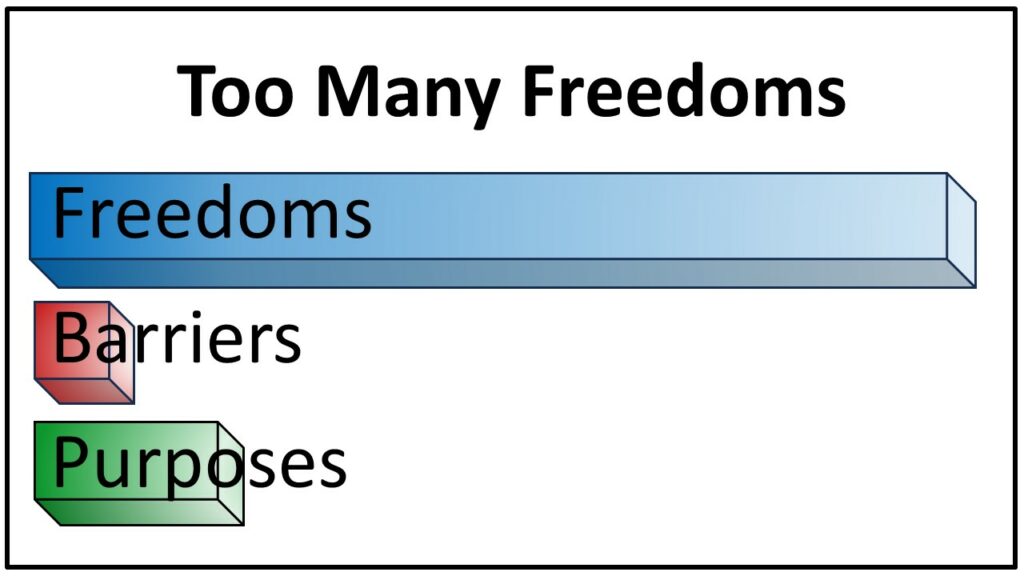 Like many people who enjoy a big amount of success (professional athletes, recording artists, lottery winners, etc.), you need new challenges to be happy.
Like many people who enjoy a big amount of success (professional athletes, recording artists, lottery winners, etc.), you need new challenges to be happy.
Fortunately, she learns to balance her three game parts. She discovers a passion to fight cancer. Based on her new PURPOSE, she dedicates her FREEDOMS (artistic talent and money) to fight a challenging BARRIER (cancer). Her life is now fun.
Demi paints again with enthusiasm. She donates the paintings to non-profit organizations for research and patient treatment. She is very happy.
Game #4: Daniel‘s Mayor Game
Daniel is about to win the election to be the new mayor!
He is winning because of his FREEDOMS which include his charming personality, years of successful management and his personal wealth. His PURPOSE to win the election is a strong energizing force for Daniel. He also enjoys beating the BARRIERS put up by the other candidates.
The three parts of his game are balanced. He is ecstatic and successful.
After he becomes Mayor Daniel, he makes a huge mistake. He continues to play the same game of winning the election. He keeps giving campaign speeches and attacks potential opponents with his unkillable energy. He does not play the game of being a mayor.
As a result, his popularity sinks. He is constantly angry. He is unhappy until he realizes the problem is with his purpose. He has a long talk with himself, does the exercise below, and works out his new game.
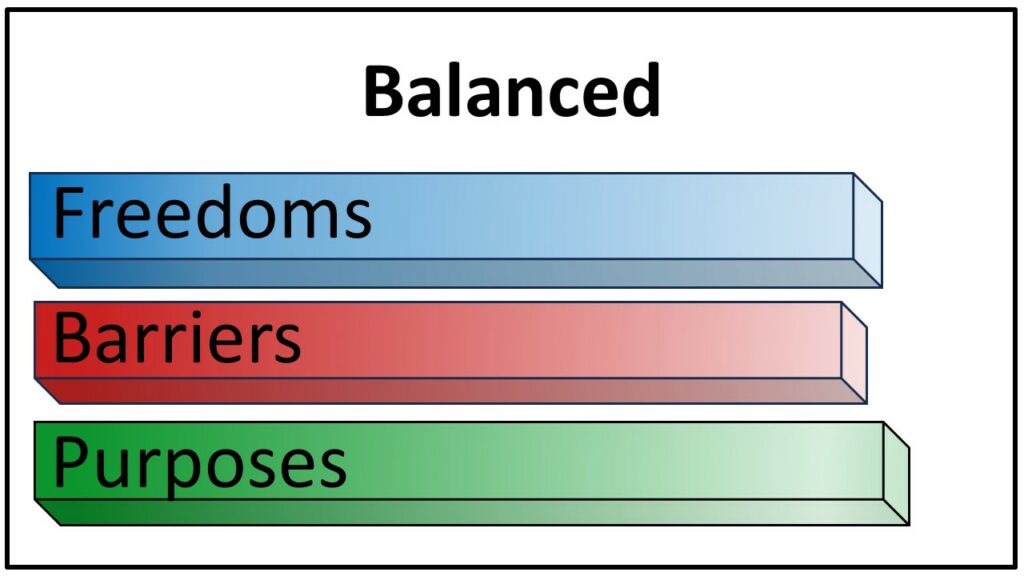 Now he has a new PURPOSE to make his city a better place to live, not win an election. He faces his new BARRIERS: crime, homelessness, traffic jams and unhappy city employees. He feels ecstatic because he loves big challenges.
Now he has a new PURPOSE to make his city a better place to live, not win an election. He faces his new BARRIERS: crime, homelessness, traffic jams and unhappy city employees. He feels ecstatic because he loves big challenges.
Daniel uses his FREEDOMS to play the game. He creates new plans for the city. He convinces the city employees to adopt his PURPOSE and work on his plans. He even gives important jobs to his former opponents, and they enjoy this new game, as well. One by one, Mayor Daniel and his team conquer the BARRIERS.
Mayor Daniel continues to balance the three parts of his mayor game and becomes the city’s best mayor in history. He is so popular, everyone supports him to stay on the job. He remains the city’s mayor for decades.
Seven Steps to Winning Any Game in Life
In his breakthrough article, “The Reason Why,” L. Ron Hubbard explains how you get better at your games in life by balancing the three parts of a game.
To help you use this powerful technology, write your answers to the following 41 questions. As you do this, you will have realizations, discover new options and find fresh ways to win your game. Write down these thoughts and ideas as they come to mind.
At some point during this exercise, you will feel motivated to play your game. When this happens, end the exercise and start playing!
Step #1: Write down your PURPOSES for the game.
1. What are my purposes for this game?
2. Why am I doing this?
3. What’s in it for me?
4. What’s in it for others?
5. What end result do I want?
6. What fires up my passion?
7. What about this game gives me energy?
8. What gives meaning to my life?
9. Do I really want to play this game?
Step #2: Write down your game’s FREEDOMS.
10. What about this game is going well?
11. What do I like about my work?
12. What makes the game easier to play?
13. What are my strengths?
14. What do people admire and support about this game?
15. What helps me win?
Step 3: Write down the BARRIERS.
16. What gets in the way of accomplishing my purposes?
17. What is not going well?
18. What might make me fail?
19. What do I dislike most about this game?
20. What are my weaknesses?
21. What causes me stress?
22. What are my biggest challenges in this game?
23. What do people dislike about my game?
24. What makes me lose?
Step #4: Create a balance of these three parts until you feel an exciting urge to play the game. To do this, go back through the above three lists. Add more purposes, more barriers and more freedoms. Make sure every part of the game is on the list.
25. Do I have any other PURPOSES to add to this list?
26. Do I have any other FREEDOMS?
27. Do I have any other BARRIERS to add to his list?
Step #5: Boost your PURPOSES.
28. How can I stay better focused on my purposes?
29. How can I make this purpose much larger?
30. Who else would like to have this purpose?
31. What helps me feel passionate?
Step #6: Reduce the BARRIERS.
32. How can I get smarter than the barrier?
33. Which of my freedoms can I use to conquer this barrier?
34. If I have no control over this barrier, what about it can I influence?
35. How can I face the barrier with less fear?
36. If I doubled my passion and purpose, how could I then attack this barrier?
Step #7: Strengthen your FREEDOMS.
37. How can I take more responsibility?
38. Who can I recruit to help me?
39. How can I increase my health, energy and stamina?
40. What knowledge can I get to help me win?
41. What assets am I not using that can help me?
Six More Uses of this Exercise
- You lose interest in a game that you need to win.
- You believe another game might be better for you.
- You get involved in too many games.
- To see if you can get better at a game.
- To help a group or another person with their games.
- To help you start new games, as well!
How Isabella Saves Bella’s
Isabella reads “The Reason Why” and spends a few hours on the exercise in this article. Below some of Isabella’s exercise answers and her realizations.
Step #1: Write down your PURPOSES for the game.
“I want to make people feel as wonderful as I did as a girl. No matter how difficult our lives might be, my mom would cook amazing Italian meals that made us feel happy. I have never promoted this purpose for Bella’s. Maybe people would like this
Step #2: Write down your game’s FREEDOMS.
“I have 30 amazing Italian recipes that give comfort and reduce people’s stress. Even though my food is delicious, it’s also healthy. So why not charge more? I think people will still come in. It’s better than closing down Bella’s, right?”
“My family is willing to help. Ah! Why not? My girls can prepare the food and wait tables after school. It will be good for them and our customers will find them charming.”
“I’m skilled at boosting people’s moods when they come in. I think I’ll write down how I do this and train my new servers to use this skill. This is a great idea!”
Step #3: Write down the BARRIERS.
“I have to be both the cook and the server. This is just too much work for me. I should spend more time working to save Bella’s and not be one of its workers.”
“My best cook had to leave for a higher-paying job. I didn’t even try to stop him or raise his pay. Maybe he’ll come back if I offer him a big bonus for helping me make Bella’s successful.”
“I owe $10,000 in bills and quarterly taxes. I’ll pay as I can, but won’t let it cause me stress.”
“The landlord wants a 25% increase in rent. I don’t think he can do this, but the lease is 27 pages and very confusing. I think I need to get out a dictionary and figure it out.”
“I’ve been too proud to let my husband and girls help me. I can get rid of this barrier by changing my mind and asking for their help.”
Step #4: Create a balance of these three parts until you feel an exciting urge to play the game.
Add More Purposes
“I have to learn how to run a successful business as one of my purposes, not just cook great food.”
“I want to do everything I can to make Bella’s profitable and enjoyable for me.”
“I want to have more courage and confidence.”
Add More Freedoms
“I’ll start asking people to help. My husband and daughters can help me.”
“I know about some management courses I can take to learn how to run the business-end of Bella’s. This knowledge will be priceless.”
Add More Barriers
“I have more fear of business matters than I knew I had. It stops me from taking bold action. It’s time to stop letting this fear stop me.”
“Okay, I know what to do! I’m done with this exercise, for now. I have a plan, I will persist, I will win this game.”


